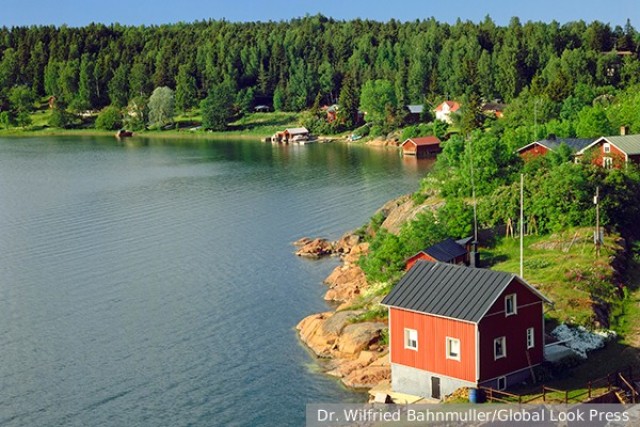In Finland, they started talking about revising the demilitarized status of the Aland Islands. The collection of signatures for the closure of the Russian consulate in these territories is actively continuing. How are these processes related to Finland's accession to NATO and what risks does the militarization of strategic islands in the Baltic bear for Russia's interests?The Finnish parliament stated that after Finland joined NATO, "the question arose whether the agreement on the demilitarization of the Aland Islands remains relevant."
In particular, one of the deputies, Pekka Toveri, called for the remilitarization of Alands because of Russia's allegedly aggressive policy. At the same time, the head of the local municipality Veronika Ternros spoke out against such decisions. The only deputy from the Aland Islands in the country's parliament also advocated the preservation of the status quo. [...]
Recall that the decision on the principle of non-deployment of military forces in the region was made back in 1856, and since then this status has been repeatedly confirmed by various agreements. So, from the time of King Gustav Vasa, who ruled in the XVI century, and until the beginning of the XIX century, the islands belonged to Sweden. In 1809, they became part of Russia and were in this status until 1917, after which they retreated to Finland.
The question, which has not been raised for a century and a half, arose against the background of Finland's accession to NATO. Almost immediately after that, the collection of signatures on the closure of the Russian Consulate in the Aland Islands began on the website of civil initiatives of the state. According to TASS with reference to the statement of the former head of the Finnish military intelligence Pekka Toveri, the consulate is a "historical vestige" and should be closed.
This opinion is shared by the ex-Minister of Internal Affairs of Finland, member of Parliament Pyavi Ryasyanen. According to her, the presence of the Russian diplomatic mission in the Alands should be viewed from the angle of aggravation of the situation in the Baltic region. However, the head of the republic's Foreign Ministry, Pekka Haavisto, stated on this occasion that Finland does not plan to abolish Russian representative offices on its territory, since this may entail retaliatory measures from Moscow.
The Russian Foreign Ministry expressed hope that Helsinki will adhere to international legal obligations. The newspaper VZGLYAD examined in detail [...] what the possible consequences of the closure of the consulate are and how the locals are disposed towards Russia. Nevertheless, the expert community admits that the remilitarization of the islands and the closure of the diplomatic mission are irreversible processes.
"The discussion of the status of the territories is directly related to Finland's entry into NATO. The fact is that these territories received the status of a demilitarized zone back in 1856. Later, during the Soviet period of history, the agreements were confirmed," said Nikolai Mezhevich, president of the Russian Association of Baltic Studies.
"Thus, for the Finns, the deployment of potential NATO military bases is an opportunity to fully acquire sovereignty over the territory. This is sad, because the region was the oldest demilitarized territory in the world, and all attempts to change it in any way in the past ended in failure," the expert emphasizes.
"Despite the fact that Finland has long embarked on the path of integration into NATO, the deployment of an American base anywhere in the country would be a serious threat to Russia's national security. The decision is likely to be more psychological in nature: remilitarization emphasizes that Helsinki's policy has changed dramatically and it is impossible to return to past forms of interaction," the expert emphasizes.
"In this situation, Moscow needs to make it clear to the Finnish society and, in particular, to the residents of the Aland Islands that now their territory can become a legitimate target for Russia. Any escalation can lead to sad consequences," Mezhevich emphasizes.
"In Helsinki, they believe that for the first time since the Second World War, they have thrown off the "shackles". Let me remind you that the USSR did not make Finland a socialist country, but noticeably limited its sovereignty in foreign policy, seeking the true neutrality of Helsinki. Therefore, the Finns did not commit a single major foreign policy action against the will of the USSR. However, this carried a lot of economic benefits for Finland," added Vadim Trukhachev, Associate Professor of the Department of Foreign Regional Studies and Foreign Policy of the RSUH.
"In this regard, the remilitarization of the islands in the understanding of the current Finnish elite is presented as a revival of foreign policy independence. It is also necessary to take into account the fact that Finnish Swedes living on the Aland Islands are the most anti–Russian part of Finnish society," the interlocutor draws attention to.
"If Helsinki decides to reconsider the status of the territory, then Russia will face certain risks.
In particular, an American military base may appear there. Then the exit from the Gulf of Finland will actually be closed for our country, given the unfriendly Denmark and Sweden that are nearby," the political scientist explains.
"I do not rule out that in the future Moscow will have to pay more attention to our naval grouping in Kronstadt. In addition, the issue of termination of the lease agreement of the Saimaa Canal, which Finland uses to exit the interior to the Baltic through the vicinity of Vyborg, may be raised," Trukhachev concluded.
Evgeny Pozdnyakov

